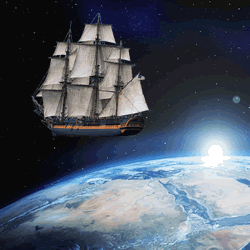
Did you know that the word astronaut means “star sailor”?
This is something I learnt from an interesting Allusionist podcast on Technobabble.
Astronaut comes from the Ancient Greek ἄστρον (ástron – star) and ναύτης (naútēs – sailor). It first appeared as the name of a space craft in Across the Zodiac, a story written by Percy Greg in the 1880. It was used in the 1920s in writing about the possiblity of space travel, and in the U.S. space program from the 1960s [source].
Some other space-related words have a nautical roots as well, including (space)ship, mast, batton and sail.
Other words for star sailors include:
– cosmonaut, from the Russian космона́вт (kosmonávt), from the Ancient Greek κόσμος (kósmos – universe) &+ -naut [source]
– taikonaut, from the Chinese 太空 (tàikōng – space) + -naut [source]
– spationaut, from spatio (space) + -naut [source]
Many other languages use one or other of these words. Here are some exceptions:
– In Chinese an astronaut is either 太空人 (tàikōngrén – “space person”), 航天員 (hángtiānyuán – “boat sky personnel”), or 宇航员 [宇航員] (yǔhángyuán – “universe boat personnel”) [source].
– In Icelandic an astronaut is a geimfari, from geimur (space) + -fari (traveler) [source].
– In Welsh an astronaut is a gofodwr, from gofod (space) + gŵr (man).
– In Swahili an astronaut is a mwanaanga, from mwana (child) + anga (sky) [source]
Are there interesting words for astronauts in other languages?
Hungarian:
űrhajós – Space sailor
Tamil: விண்வெளி வீரர் (viṇveḷi vīrar) – space “hero”